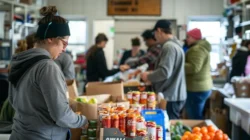The scene is entirely too familiar to anyone who has been on a date in Georgetown: Two people are sitting at a table, chatting politely and enjoying their meals or a glass of wine, when a stranger ambles up to their table. Wearing a suede or leather jacket and armed with a wicker basket of roses, the new guest politely gestures and asks if one would like “a flower” for their companion. The awkwardness sets in as a rose is either purchased or turned down, and the man slowly pulls his offering away and moseys to the next table in his course around the restaurant.
The famous, or infamous “flower guys,” are established figures in the Georgetown community, and have long provided a unique flair for neighborhood eateries. “Everyone loves the flower guys,” said David Frandano, a manager of J. Paul’s restaurant on M Street. No one really knows who they are, where they come from, or why they decided to sell flowers in Georgetown. Their presence feels atypical, and their business structure is as strange as their existence.
With these questions in mind, I set out to try to follow the flower men and perhaps sell their goods for them. Armed with a basket of flowers, a leather jacket and a cordial smile I set out to create the uneasy atmosphere I had heard about and see if I could infiltrate the flower market myself. I assumed that because the agreements between the flower men and the restaurants were unstated and informal, I could join the market and test the effect of a different personality on flower sales. Unfortunately, the two groups colluded to stymie my efforts; both the flower men and restaurant managers refused to accommodate my experiment. Georgetown’s two main flower men repeatedly claimed that they were too busy and refused to let me sell for them, saying it would “aggravate customers.” The restaurant managers were defensive because they have grown close to their flower men, and with the vendors’ commercial benefits contingent on their sole possession of the market, they refused to let me in. By locking me out of the market, they ensured that I wasn’t future flower competition before even speaking with me. “You’re not trying to scout out their methods for competition are you?” a manager of Old Glory asked. “Jimmy is the only guy we allow to sell flowers in here, and that won’t change.”`
Many assume that there is a single flower seller who canvasses the streets of Georgetown solo, working his way from restaurant to restaurant on his own. There are, in fact, two main flower men who operate in the greater Georgetown area. One, Ali Abbibi, claims to have a staff of three to four other men who work with him on the M Street-Wisconsin Avenue circuit during high-volume evenings.
Abbibi is approximately 40 years old and is originally from Jordan. His flower sales provide his main source of income, and he sells the flowers year-round. He has been selling in Georgetown for the past decade, and has earned a welcoming from the host and managerial staffs at a number of Georgetown restaurants. Abbibi works the upper Wisconsin Avenue area to Au Pied de Cochon on his own, as well as the restaurants along O Street. Abbibi visits the most restaurants on Potomac Avenue but only a sparse few on M Street itself. He travels as far down as the waterfront, where he registers particularly high sales at the outdoor bars and restaurants along the boardwalk.
Abbibi’s main competition in the neighborhood is a man affectionately known only as Jimmy, who appears to be in his fifties, and has been selling in Georgetown for over 15 years. Jimmy shops his goods across the neighborhood as well, but has a virtual stranglehold on the M-Street restaurants between 30th and 32nd Street. These restaurants-including Old Glory, Mie N’ Yu, Bistro Francais, and Pizzeria Uno-allow only Jimmy to sell his flowers to their customers.
While one might assume that covering the same territory would breed turf wars between the two flower purveyors, the men have developed a complicated and silent understanding of who will sell where. The two share a narrow swath of the larger neighborhood and never have discussed entering the same restaurant. Even more fascinating, the restaurant owners themselves only know the flower men that service their location, and had no idea that multiple flower men existed.
Both men charge similarly for their roses, which they insist are locally grown. The flowers generally cost $10 for a bunch, or $5 for two, although these prices may be adjusted for demand on any given night. “They charge $1 or $2 a flower,” added a manager of Old Glory, who spoke on the condition of anonymity. The men also adjust their routes for demand depending on how much business the restaurant is doing. “Jimmy may come in three times in a night if we’ve got a lot of people,” the manager of Old Glory said. “Or he may just stop by once if it’s a slow night. When we’re really busy, like on Valentine’s, we often order bunches of flowers in advance, and he knows how much he’ll probably sell. But he comes in every night like clockwork.”
While both the street entrepreneurs work long shifts, walking the streets from five to 10 nightly, they have no official agreements with any of the restaurants in which they sell. Despite the fact that they receive nothing in return for their hospitality to the flower vendors, restaurant managers and hosts are fiercely loyal to their presence in their establishments and the neighborhood as a whole. “They’re tremendously nice guys,” said a manger of Bangkok Bistro. “They’re very polite and courteous, and always are smiling at you and the customers.”
Bangkok Bistro and Prince Caf, on Prospect Street are two of the only restaurants where both flower men sell their goods, and both restaurants have asked special requests of them as a result. “The only thing I’ve asked of them is that they don’t show up at the same time, that they spread themselves out a little bit,” the Bangkok manager said. Despite a more relaxed dining and hookah smoking atmosphere, Prince Caf asked a similar favor. “They’re really good about timing it so that they’re never here too close together,” a manager of Prince, who also asked to be anonymous, said. “Still, we don’t really know them. They’re both a bit of a mystery.”
Just as some Georgetown restaurants are fiercely loyal to their flower providers, others are opposed to their presence in the community and have refused their services. Clyde’s restaurants on M Street doesn’t allow the men to sell their flowers to customers, and relayed a negative impression of the men themselves. “I’ve only seen them in here maybe once,” said hostess Angie Calcaterra (CAS ‘04). A fellow hostess said “Quite honestly, I think they’re annoying and smell bad.” Other restaurants, including Italian staples Filomena and Papa Razzi, also refuse the services of the men. “I don’t know why they don’t come in,” Stephanie Gayant, a hostess at Papa Razzi said. “I’ve never been told why. It may be because the owners and managers don’t want them stopping in, or it may be because we’re not directly on the strip [M Street].”
While these detractors limit the scope of the flower men’s sales area, they don’t dampen the enthusiasm that other managers and hosts have for their flower purveyors. “He’s a really wonderful guy,” said Stefano Cappelli, a manager of Caf Milano on Prospect Street. “He’s really polite and knows the owner.” The manager of Bangkok Bistro concurred: “I think he’s good for our customers and the area. He really brings a European feel to the neighborhood that you can’t get anywhere else. It makes Georgetown unique.”
Cappelli and others also feel that customers are almost universally happy with their encounters with the flower peddlers, and no managers or hosts had memories of witnessing any negative responses. “They’re usually just happy to get a flower,” said Frandano of J. Paul’s. “I’ve never noticed a real negative response.”
Some who have received the flowers also relayed positive responses. Gayant said she was pleased when she received a flower once, and didn’t have a problem with their presence in general either. “It’s their job. It’s what they do,” Gayant said. “You can’t really get upset with them.”
This faith in the men’s general benevolent contribution was not shared by some students, who expressed a sense of awkwardness on receiving the flowers or on sending the men along their way without purchasing them. “One time, a friend and I were going to a dance with two guys,” an anonymous female Georgetown student said. “We went to the bathroom and when we came back there were two roses that they had bought from the flower guy for us. It was kind of sweet, but kind of weird too, because it almost felt like it added something to the evening that wasn’t really there.”
Students purchasing the flowers also expressed that sense of awkwardness. “It can suck the air out of a conversation,” one student said. “It can take a few minutes to get back into the frame of reference, and it’s just distracting.”
Despite being shut out of the flower market myself, I was left with the distinct impression that the flower men are a unique Georgetown institution that is neither wholly beneficial or damaging, but that conjures myriad emotions in both customers and those who facilitate their sales. One thing is certain though: When I’m out on a date next week, or the week after, at some point I’ll be approached by a familiar face, which will offer my date a flower with a wry smile and await my approval.





